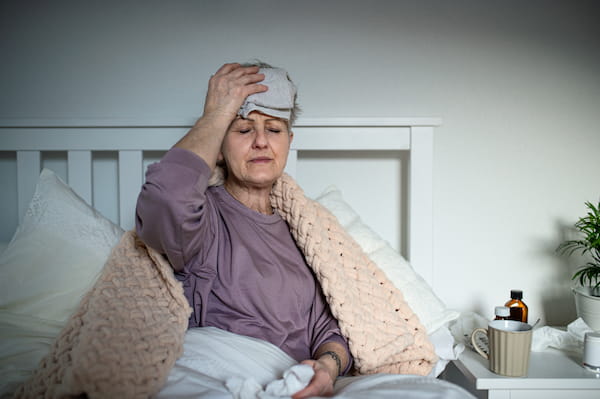
HRT side effects are often a concern for many women who are considering Hormone Replacement Therapy.
HRT is used to relieve menopausal symptoms, prevent osteoporosis, and reduce the risk of heart disease.
HRT can also help with depression and hot flushes that are due to menopause. However, some HRT side effects may be cause for concern.
In this article, we will discuss the potential benefits as well as HRT side effects so you can decide whether or not Hormone Replacement Therapy is right for you! If you want to know more check out our article on ‘HRT: Everything You Need To Know’.
What is Menopause?
Menopause is the point in a woman’s life when she stops having her menstrual period because her ovaries are making less oestrogen. Menopause can begin in your 40s or 50s. Some women go through menopause when they are young, even before age 40.[1] Men in their 40s or 50s may experience ‘male menopause’ known as Andropause, but this is generally much milder than the symptoms felt by menopause.
What are the Symptoms of Menopause?
These symptoms usually get worse with time but there are ways to manage them. Some symptoms can include:
- Hot flushes
- Night sweats
- Vaginal dryness
- Mood swings
- Low libido
Some women may also have trouble sleeping or concentrating during menopause. Women who smoke tend to have more severe symptoms.

What is the Treatment for Menopause?
Treatment generally includes hormone therapy, which can help with symptoms. [2] Women should talk to their doctor before using any supplements or alternative therapies as they have not been proven safe during pregnancy and breastfeeding.
The treatments for menopause include:
- HRT – The hormone Hormone Replacement Therapy is a form of treatment that uses oestrogen and progesterone to alleviate the symptoms and pain of menopause.
- CBT – Cognitive behavioural therapy is another type of treatment where women are provided with cognitive therapy in order to train them to deal with their symptoms and pain.
- Eating a healthy diet can also help reduce the symptoms of menopause by providing some with the nutrients they need to cope without the need for medication.
Doctors recommend that women go through menopause around age 51 so a woman’s childbearing years are over.
Who is affected by Menopause?
Women who are of average weight, non-smokers, and do not drink alcohol are at lower risk for menopause. However, many women still experience these symptoms due to lifestyle factors.
Menopause is typically diagnosed with a simple blood test that measures oestrogen levels in the body. The diagnosis is done when a woman has menstrual periods that last less than three months per year.
Oestrogen levels decrease gradually over time, which can cause symptoms. Most women experience menopause between the ages of 45 and 55. The average age of menopause in the UK is 51. [3]
What are the benefits of HRT?
Hormone Replacement Therapy can help menopausal symptoms, prevent osteoporosis and reduce the risk of heart disease.
Hot flushes are a common symptom that affects 70% of women going through menopause. Hot flushes usually last for less than five years but they may come back later on.
HRT can help reduce hot flushes, night sweats and vaginal dryness. It also helps prevent bone loss that leads to osteoporosis which is a common problem for women during menopause. [4]
This risk of osteoporosis increases as you get older so HRT treatments are usually recommended by doctors if your bones have started to thin.
Studies have also shown that HRT reduces the risk of heart disease, which is a common cause of death for women in menopause. [5]
Heart attacks are the number one killer during this time period but hormone therapy can help lower your chances as well as manage other conditions such as high cholesterol and blood pressure.

How can HRT (Hormone Replacement Therapy) help to reduce Menopause symptoms?
HRT is a treatment that can be used to replace the hormones that are lost when someone is in perimenopause or menopause. HRT uses oestrogen, progesterone, or both of these together to help keep someone’s hormone levels more normal. Oestrogen and progesterone are the sex hormones made by the ovaries for women before they reach menopause.
HRT can help with hot flushes, night sweats, vaginal dryness, anxiety, irritability, mood changes, difficulty sleeping, problems with memory or concentration, trouble thinking clearly, or making decisions. [6]
HRT can help to reduce the symptoms of menopause. It is essential that women have regular doctor visits to monitor their HRT treatment, especially when taking hormones orally or transdermally.
What are the different types of HRT?
There are two main forms of hormone therapy: combination oestrogen-progestin treatment or oestrogen replacement. It is important to talk with your doctor about the potential benefits and risks of each form before starting any type of hormonal treatment.
What are the HRT side effects?
All forms of hormone therapy are not necessarily safe and should be discussed with your doctor before starting any type of hormonal treatment.
If you choose to take oestrogen alone (without progesterone), it’s important to understand what benefits you may experience as well as possible side effects like:
- Increased risk for breast cancer / uterine cancer
- Blood clots in legs/lungs/heart disease
- Weight gain
- Headaches
- Nausea
- Cramps
- Fluid retention around ankles or abdomen
- Mood swings
- Depression
Can I order HRT online?
Yes, you can order HRT online, but it is always recommended to talk to your doctor first. They can help you find the right type of HRT for you and can also monitor your progress. There are several treatments available on e-Surgery, including:
Each of these treatments comes with its own set of side effects and results, so it’s important to talk to your doctor to find out which one is right for you.
Menopause is a natural process that occurs in women as they age. Symptoms of menopause include hot flushes, night sweats, insomnia, mood swings and vaginal dryness.
There are many treatments available to help reduce these symptoms including HRT (hormone replacement therapy). HRT can be reached by way of prescription from your doctor or through ordering it online if you have been deemed eligible for this treatment.
Choosing the right type of hormone replacement may depend on how severe your symptoms are but some side effects include increased risk for blood clots and certain cancers.
Sources
- About Menopause (NHS)
- Menopause Treatment (NHS)
- Average Age Of Menopause (NHS)
- HRT Benefits (NHS)
- HRT Reduces Heart Diseases (NCBI)
- Relieve Menopausal Symptoms (NHS)
Further Reading
- Hormone Replacement Therapy for Menopause (Webmed)
- Hormone replacement therapy (HRT) (NHS UK)
- Hormone replacement therapy (HRT) (NHS inform)









